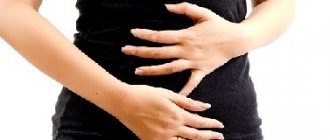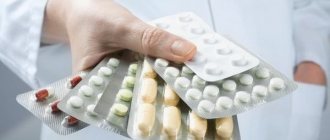General treatment tactics
To achieve the desired result, it is necessary to carry out complex treatment. The range of events includes:
- Strict adherence to the doctor’s recommendations on diet and diet;
- Taking all prescribed medications on time and according to the prescribed schedule;
- Giving up bad habits and normalizing the patient’s condition (a psychologist may be required);
- Spa treatment.
In certain cases, surgery may be required.
Main groups of drugs
Let's look at the main groups of drugs that are most often used in the treatment of gastritis and stomach ulcers.
- Antacids. Medicines in this group coat the inner wall of the stomach and also neutralize excess hydrochloric acid;
- Antibiotics. These can be tablets, suspensions, water for injection, which are used to relieve the inflammatory process in the stomach;
- Gastroprotectors. These medications have a single-component or combined composition. They are used to restore damaged mucosa and protect it from gastric juice;
- Digestive enzymes. They are used to treat stomach diseases that develop against the background of impaired absorption of carbohydrates, proteins, fats and biologically active substances;
- Dopamine receptor blockers. These drugs help stop an attack of nausea during or after eating, flatulence;
- Antihistamines. These drugs are used to treat ulcers and gastritis if they are caused by the penetration of allergic agents into the body;
- Proton pump blockers. These medications are used when the pH of the gastric juice is low;
- Antimicrobial agents. They are used if it is necessary to enhance the effect of antibiotics;
- Antispasmodics. These drugs have antispasmodic and analgesic effects.
To treat any form of ulcer and gastritis, the doctor may prescribe 4-5 types of medications. People who have poor health can additionally take Makrovita, Pikovita, Complivita, Supradin (vitamins), etc.
The effectiveness of treating gastric ulcers
In order for drug therapy to achieve positive results and not cause harm to health, it is prescribed by a gastroenterologist or therapist.
Attention! Medicines for the treatment of ulcers are selected by a specialist strictly on an individual basis, taking into account the age specifics of the body, well-being, previous and existing illnesses, possible manifestations of allergies and the degree of damage to the gastric mucosa.
The funds are prescribed comprehensively, since their use requires achieving a number of goals:
- Destroy any detected bacteria.
- Reduce or increase the acidity of gastric juice.
- Protect the mucous membrane.
- Regenerate damaged tissue.
- Restore digestive function.
- Normalize peristalsis.
- Relieve side unpleasant signs of the disease - nausea, vomiting.
Development of stomach ulcers
Medical treatment is carried out using 3 groups of medications:
- Antibiotics.
- Histamine receptor blockers.
- Proton pump inhibitors.
Medication therapy is indicated if:
- the acute course of the pathology is expressed;
- there are no improvements with a long and strict diet, after taking medications like Festal;
- obvious progression of clinical signs;
- the pathology is caused by a virus;
- intense pain occurs that does not stop after using traditional methods of treatment;
- stable remission has been achieved, ulcer prevention measures are being taken with medications.
Video - Stomach ulcer
In what cases is antibacterial therapy required?
Antibiotics are medications designed to fight bacteria that cause gastritis or ulcers. If, during the examination, a large degree of Helicobacter pylori microorganisms was detected in the patient, during the examination the doctor sees atrophy or foci of erosion, and the patient himself complains of symptoms such as stool disorders, heartburn, then such a person must be prescribed antibacterial therapy.
Taking antibiotics must necessarily be combined with taking medications that restore damaged gastric mucosa and accelerate the renewal of damaged areas.
Combination of penicillins and macrolides
The combination of Clarithromycin (penicillin group) and Amoxicillin (macrolide) enhances the effect of these two drugs. This treatment regimen is considered one of the most effective. Its effectiveness has been verified by numerous studies. By the way, the same treatment regimen is used to treat stomach ulcers abroad.
Side effects may occur when taking these medications.
Combination of tetracyclines and metronidazole
After the examination, the doctor may prescribe Metronidazole in combination with Tetracycline. They should be taken according to the following regimen: Metronidazole 500 mg twice a day + Lansoprazole (30 mg) twice a day, Tetracycline (500 mg) four times a day and colloidal bismuth subcitrate (dosage is 240 mg) twice a day.
The total duration of treatment ranges from seven to ten days.
Remedies for acid-dependent stomach conditions
Omeprazole is a potent drug that partially or completely inhibits the production of enzymes necessary for the production of acid in the stomach. It has a long-lasting effect and is more effective than H2 blockers. For reduction, Gastal, Rennie, Almagel, Gaviscon, Phosphalugel, Rutacid, De-Nol, Vikalin can be prescribed.
Despite similar symptoms, treatment with antisecretory or antacid medications for low acidity is completely unacceptable.
It's not just the food that's to blame
For a long time, poor nutrition was blamed for the occurrence of ulcers. Since rough and spicy foods promote increased production of hydrochloric acid, it was believed that such food could “burn through” the gastric mucosa. However, junk food alone is not enough to cause ulcers. One of the causes of the disease was stress. There is even a special term - a stress ulcer, which can appear in a few hours in people due to severe emotional shock.
Another type of ulcer is medicinal. It can occur against the background of long-term use of non-steroidal anti-inflammatory drugs, which, when they enter the gastric mucosa, penetrate directly into the epithelial cells and damage them.
But the main culprit of ulcers is considered to be the bacterium Helicobacter pylori, which has an extremely negative effect on the gastric mucosa.
Helicobacter is the most common bacterium on earth. It lives in the stomachs of 70–80% of Russians. However, not everyone gets a stomach ulcer. For an ulcer to occur, aggravating circumstances are needed - the same stress, poor diet and bad habits: smoking and alcohol abuse.
For gastritis, contagious and inherited. Debunking myths about stomach ulcers Read more
Basic medicines for stomach ulcers
If suddenly a person suspects a stomach ulcer, he should urgently go to the hospital for help. After the examination, the doctor will select the safest treatment regimen.
Antibiotics
Antibiotics prevent infection during an exacerbation of an ulcer, improve the general condition of the body, and also suppress pathogenic viruses, including H. pylori.
The list of antibacterial drugs prescribed to the patient includes macrolides, penicillins, nitromidazole derivatives and tetracyclines.
Histamine-H2 receptor antagonists
Histamine H2 receptor antagonists can be used to treat ulcers or gastritis. This group of drugs includes drugs such as Ranitidine, Cimetidine, Lafutidine, Nizatidine, Famotidine, Roxatidine, Niperotidine, Ranitidine bismuth citrate, Mifentidine.
You can also consider Tavegil, Suprastin, Loratadine, Telfast, Erius.
Proton pump inhibitors
For the treatment of peptic ulcers, gastritis, and duodenitis, medications from the group of proton pump inhibitors are often prescribed.
These include drugs such as Acrylanz, Lanzap, Epicurus, Lancid, Gastrozol, Zerotsid, Losek, Omezol, Chrismel, Zolser, Omez, Otsid, Romesek, Ulzol, Helol, Pantaz, Controloc, Panum, Nolpaza, Rabiet, Ultera, Nexium , Emezol, Neo-zext and others.
Treatment of gastritis and stomach ulcers: 3 ways
Gastroprotective drugs, regenerants, anabolics
Often, gastroprotective medications may be prescribed to treat gastritis or stomach ulcers. These include Sucralfate (a drug that has a protective, adsorbent, antiulcer, antacid, enveloping effect), Solcoseryl (a drug whose action is aimed at improving cellular metabolism).
Medicines such as Enprostil, Misoprostol, Actovegin, Biogastron, Amigluracil, Methyluracil, Romazulan, Histidine hydrochloride may also be prescribed.
Cholinergics and antacids
Antacids include medications such as Rennie, Gastal, Gaviscon, Almagel, Maalox, Phosphalugel.
Cholinergic drugs include drugs such as Gastrocepin, Buscopan, Metacin (a milder drug), Platyfillin, Ethanol.
Antiemetic drugs
Antiemetic medications that are used for ulcers or gastritis include:
Motilium. This drug is aimed at relieving nausea. The medicine does not affect the secretion of gastric juice.- Cerucal. This drug stops the transmission of nerve impulses from dopamine receptors to the vomiting center in the human brain. It also stimulates intestinal motility.
- Metoclopramide. There is an opinion that the medicine not only suppresses the attack of vomiting, but also promotes the healing of the ulcer.
Antispasmodics
Antispasmodics are drugs that reduce spasm of smooth muscles. They are used for abdominal pain that accompanies these diseases.
Papaverine, Duspatalin, Trimedat, Dicetel, No-Shpa, Niaspam, Nifedipine, Spasmomen, Iberogast, Meteospasmil are often used.
All gastroenterology clinics and medical centers in your city. Tests and ultrasound. Consultation with a gastroenterologist. Diseases of the digestive system. Find out more: - In Kiev (Hertz, Ilaya, Euromed) - In St. Petersburg (SM-Clinic, Longevity, Allergomed, Doctor +, BaltZdrav, Professor) - In Moscow (SM-Clinic, Medlux, Onmed) - In Kharkov ( TsMEI, Olympic, Victoria, Fortis, Ecomed) - In Minsk (Belgirudo, Art-Med-Company, Sinlab, Mikosha, GrandMedica, MedClinic) - in Odessa (Medea, On Clinic, Into Sano, Venus) - In Razyan (Trust + , Polyclinic-Pesochnya, Evrikas +) - in Nizhny Novgorod (Only Clinic, Alpha Center, EuroClinic, SOLO, Altea) - gastroenterological clinics of Tyumen (Doctor A+, Clinic "Vera", Avicenna, Medis, Sibirina, Your Doctor)
Possible side effects of drugs
If you take certain medications incorrectly, side effects may occur. Most often they are associated with stomach disorders, such as flatulence, bloating, headaches and dizziness. Side effects can also manifest themselves in the form of allergies, for example, redness of the skin, itchy pimples, fever, cough, runny nose, etc.
Quite rarely, drugs aimed at treating gastrointestinal diseases can have an adverse reaction in the form of decreased libido, impotence, and mastopathy.
Preparations for mucosal protection
If there is a defect in the mucosa, it is especially important to protect it from further irritation by acid and food particles. For this purpose, gastroprotectors are used, for example, De-nol or Venrisol. Once the drugs enter the stomach under the influence of acid, they form a film that covers the defects, protecting them.
Misoprostol may also be used. It is part of the drug Cytotec. The tablets not only protect the mucous membranes, but also reduce acidity. Liquiriton is often prescribed. The drug activates the secretion of mucus, which is especially necessary not only to protect the mucous membrane, but also for the formation of food chyme. In addition, the active components relieve spasms and inflammation.
Gastroprotectors protect the mucous membrane from damage by food particles
Drugs are eliminated by the kidneys and liver. Accordingly, the drugs should not be used in cases of severe dysfunction of these organs. In addition, heart pathologies, hypertension, glaucoma, diabetes mellitus, and so on may be limitations.
The drug Cytotec is strictly contraindicated in women who suspect pregnancy, as it can cause spontaneous abortion.
Side effects that may occur with the use of these drugs include nausea, skin rashes and weakness. In case of overdose, bismuth affects brain functions.
Harm from self-medication
Doctors strongly do not recommend self-medication. This measure is due to the fact that:
if the patient guesses his diagnosis, then there is a very high probability of prescribing himself the wrong treatment regimen and the wrong drugs that are required;- in most cases, the patient misdiagnoses himself, hence the ineffective treatment (at best);
- drugs that the patient prescribes to himself may react with other drugs taken by patients;
- Taking the drug “blindly” can mask the symptoms of the true disease.
The main danger of such treatment is the loss of time. Even minor health problems, which with adequate treatment may go away within a few days, can develop into a real problem.
Spontaneous use of certain medications often leads to the development of complications.
Will we get treatment?
Diagnosing an ulcer is not difficult. An experienced doctor will make a diagnosis based on examination and history, but to confirm the diagnosis you will need gastroscopy - an unpleasant procedure, but quick and informative.
To treat peptic ulcers, patients are prescribed several types of antibiotics and antacids - drugs that neutralize hydrochloric acid and form a protective film on the stomach wall. The course of treatment takes two weeks. In this case, relief occurs after 3–5 days; it takes about a month and a half for the ulcer to heal. All this time, the patient must adhere to diet No. 1, which excludes any irritants (chemical and thermal) and stimulants of gastric juice secretion (hot, spicy, fatty foods). The diet also requires eating food at a temperature that is comfortable for the stomach – 40–50 degrees, 5–6 times a day. It is difficult to stay hungry on such a diet. You can eat porridge, mashed potatoes, vermicelli, boiled and stewed meat and vegetables. You will have to give up strong tea and coffee. From smoking and alcohol - even more so.
Article on the topic
How to eat deliciously when you have a stomach ulcer. Menu for dietary table No. 1









